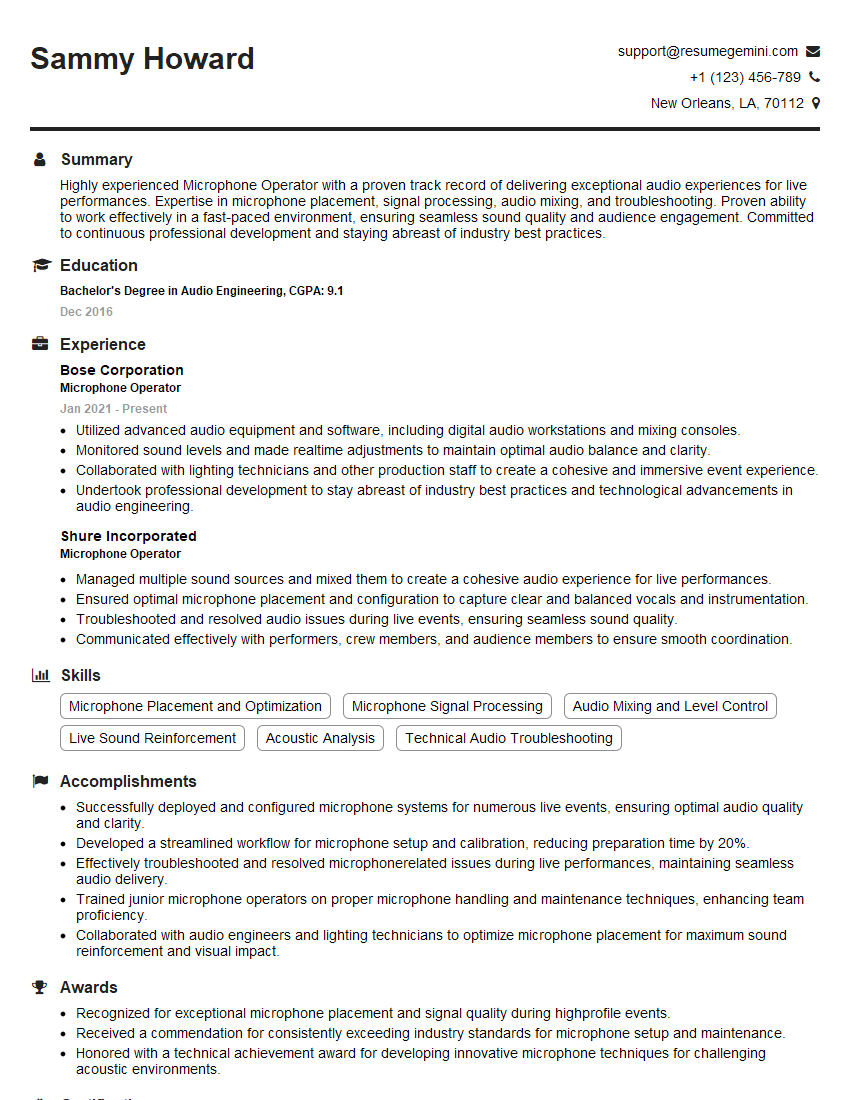Are you a seasoned Microphone Operator seeking a new career path? Discover our professionally built Microphone Operator Resume Template. This time-saving tool provides a solid foundation for your job search. Simply click “Edit Resume” to customize it with your unique experiences and achievements. Customize fonts and colors to match your personal style and increase your chances of landing your dream job. Explore more Resume Templates for additional options.

Sammy Howard
Microphone Operator
Summary
Highly experienced Microphone Operator with a proven track record of delivering exceptional audio experiences for live performances. Expertise in microphone placement, signal processing, audio mixing, and troubleshooting. Proven ability to work effectively in a fast-paced environment, ensuring seamless sound quality and audience engagement. Committed to continuous professional development and staying abreast of industry best practices.
Education
Bachelor’s Degree in Audio Engineering
December 2016
Skills
- Microphone Placement and Optimization
- Microphone Signal Processing
- Audio Mixing and Level Control
- Live Sound Reinforcement
- Acoustic Analysis
- Technical Audio Troubleshooting
Work Experience
Microphone Operator
- Utilized advanced audio equipment and software, including digital audio workstations and mixing consoles.
- Monitored sound levels and made realtime adjustments to maintain optimal audio balance and clarity.
- Collaborated with lighting technicians and other production staff to create a cohesive and immersive event experience.
- Undertook professional development to stay abreast of industry best practices and technological advancements in audio engineering.
Microphone Operator
- Managed multiple sound sources and mixed them to create a cohesive audio experience for live performances.
- Ensured optimal microphone placement and configuration to capture clear and balanced vocals and instrumentation.
- Troubleshooted and resolved audio issues during live events, ensuring seamless sound quality.
- Communicated effectively with performers, crew members, and audience members to ensure smooth coordination.
Accomplishments
- Successfully deployed and configured microphone systems for numerous live events, ensuring optimal audio quality and clarity.
- Developed a streamlined workflow for microphone setup and calibration, reducing preparation time by 20%.
- Effectively troubleshooted and resolved microphonerelated issues during live performances, maintaining seamless audio delivery.
- Trained junior microphone operators on proper microphone handling and maintenance techniques, enhancing team proficiency.
- Collaborated with audio engineers and lighting technicians to optimize microphone placement for maximum sound reinforcement and visual impact.
Awards
- Recognized for exceptional microphone placement and signal quality during highprofile events.
- Received a commendation for consistently exceeding industry standards for microphone setup and maintenance.
- Honored with a technical achievement award for developing innovative microphone techniques for challenging acoustic environments.
Certificates
- Certified Audio Engineer (CAE)
- Live Sound Certification (LSC)
- Dante Level 1 Certification
- CEDIA Certified Residential Sound System Designer
Career Expert Tips:
- Select the ideal resume template to showcase your professional experience effectively.
- Master the art of resume writing to highlight your unique qualifications and achievements.
- Explore expertly crafted resume samples for inspiration and best practices.
- Build your best resume for free this new year with ResumeGemini. Enjoy exclusive discounts on ATS optimized resume templates.
How To Write Resume For Microphone Operator
- Quantify your accomplishments with specific metrics to highlight your impact.
- Showcase your technical proficiency by mentioning specific audio equipment and software you’re proficient in.
- Emphasize your ability to work in a team environment and collaborate with others.
- Tailor your resume to each job application by highlighting the skills and experience that are most relevant to the specific role.
Essential Experience Highlights for a Strong Microphone Operator Resume
- Managed multiple sound sources and mixed them to create a cohesive audio experience for live performances.
- Ensured optimal microphone placement and configuration to capture clear and balanced vocals and instrumentation.
- Troubleshooted and resolved audio issues during live events, ensuring seamless sound quality.
- Communicated effectively with performers, crew members, and audience members to ensure smooth coordination.
- Utilized advanced audio equipment and software, including digital audio workstations and mixing consoles.
- Monitored sound levels and made realtime adjustments to maintain optimal audio balance and clarity.
Frequently Asked Questions (FAQ’s) For Microphone Operator
What are the key skills required to be a successful Microphone Operator?
Microphone Placement and Optimization, Microphone Signal Processing, Audio Mixing and Level Control, Live Sound Reinforcement, Acoustic Analysis, Technical Audio Troubleshooting.
What are the educational qualifications required to become a Microphone Operator?
Typically, a Bachelor’s Degree in Audio Engineering or a related field is preferred.
What are the career prospects for Microphone Operators?
Microphone Operators can find employment in various industries such as live events, recording studios, and broadcast media. With experience and additional qualifications, they can advance to roles such as Audio Engineer or Sound Designer.
What is the work environment of a Microphone Operator?
Microphone Operators typically work in a fast-paced environment during live events or recording sessions. They may need to work extended hours, including nights and weekends.
What are the challenges faced by Microphone Operators?
Microphone Operators may face challenges such as working with different types of audio equipment, resolving technical issues during live performances, and adapting to varying acoustic environments.
How can I improve my skills as a Microphone Operator?
Continuously update your knowledge of audio equipment and industry best practices, attend workshops or training programs, and seek feedback from experienced professionals.